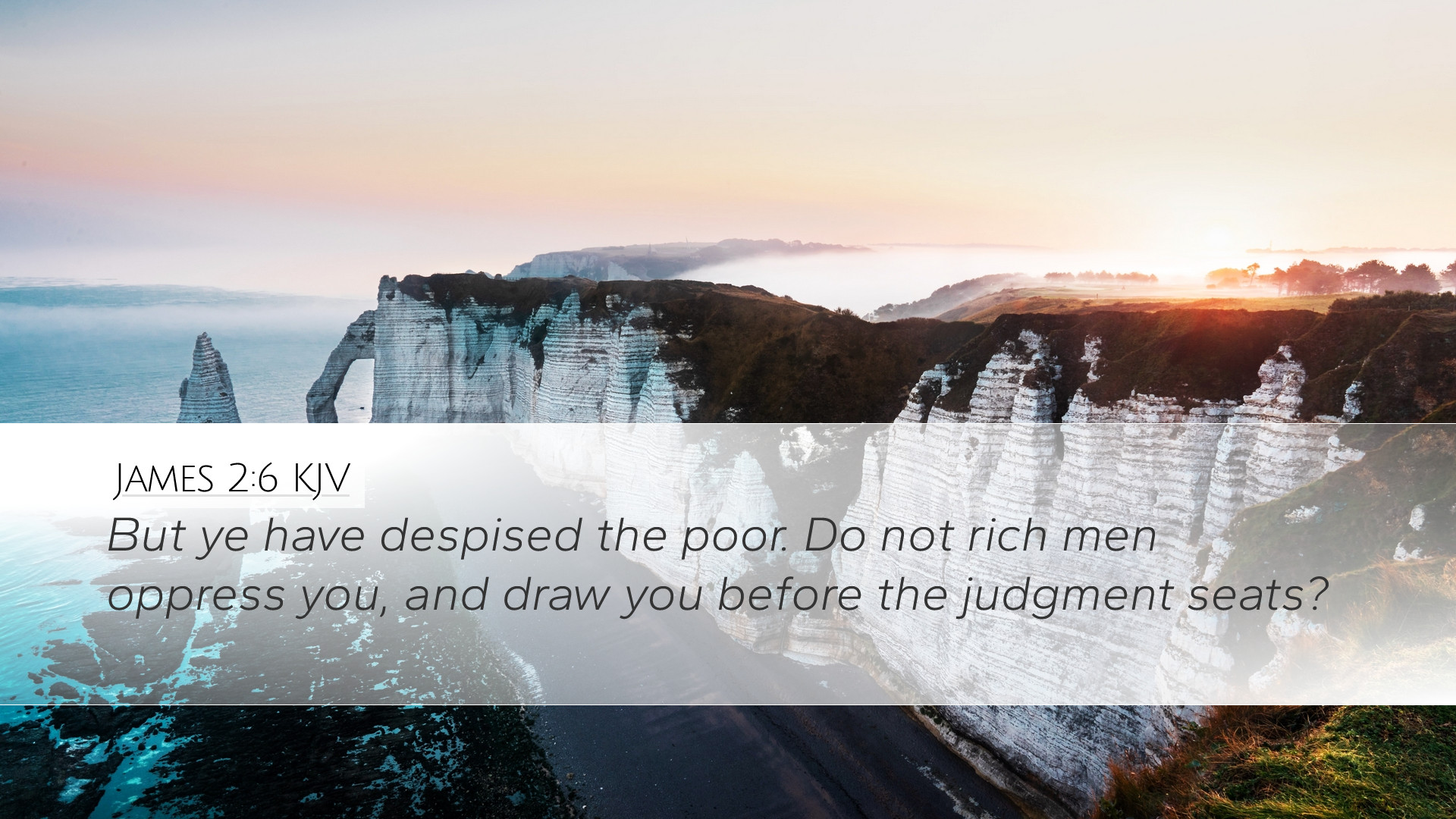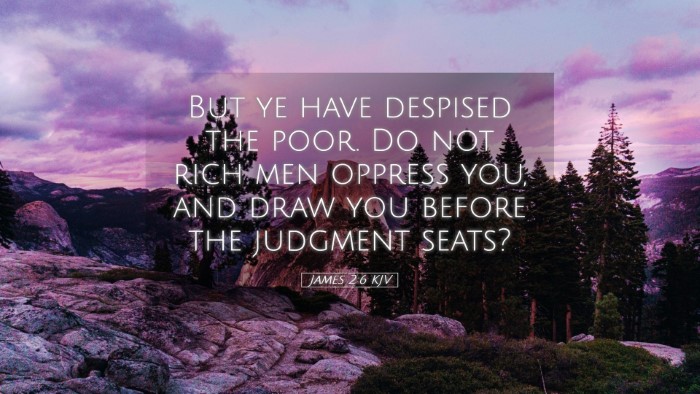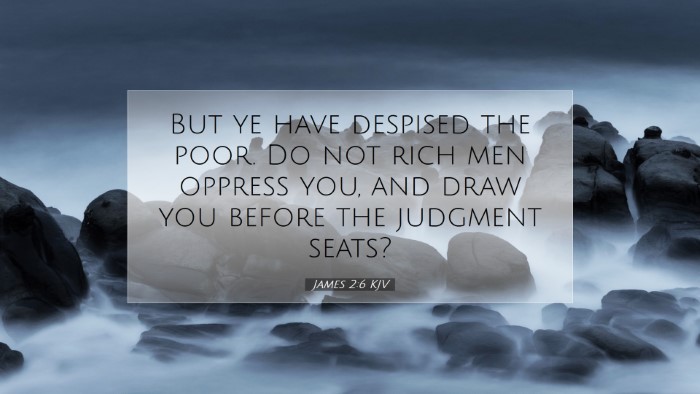Old Testament
Genesis Exodus Leviticus Numbers Deuteronomy Joshua Judges Ruth 1 Samuel 2 Samuel 1 Kings 2 Kings 1 Chronicles 2 Chronicles Ezra Nehemiah Esther Job Psalms Proverbs Ecclesiastes Song of Solomon Isaiah Jeremiah Lamentations Ezekiel Daniel Hosea Joel Amos Obadiah Jonah Micah Nahum Habakkuk Zephaniah Haggai Zechariah MalachiJames 2:6
James 2:6 KJV
But ye have despised the poor. Do not rich men oppress you, and draw you before the judgment seats?
James 2:6 Bible Commentary
Commentary on James 2:6
Verse Context: James 2:6 states, "But you have dishonored the poor man. Is it not the rich who oppress you and the ones who drag you into court?" This verse encapsulates a broader discussion on the treatment of the poor versus the wealthy, and it serves to remind us of the moral implications of our societal biases.
General Observations
The Epistle of James is often lauded for its practical application of Christian faith. In this section, James confronts the sin of partiality, particularly toward the wealthy. The rich are often seen as the benefactors of society due to their resources, yet James defies this notion by highlighting their oppressive actions against the poor.
This commentary amalgamates perspectives from various public domain commentaries, providing insights integral for pastors, theologians, and students of the Bible.
Insights from Matthew Henry
Matthew Henry emphasizes the moral gravity of dishonoring the poor, equating it to a selfish disregard for Christ’s teachings. He argues that such favoritism is not only worldly but also counter to the essence of Christianity, which is predicated on humility and service to others.
Henry points out that the rich frequently exhibit a proclivity towards oppression, as their status can incite a sense of entitlement. He warns that the church, being a community of faith, should not mirror societal injustices. Instead, it should be a sanctuary where the poor are honored and supported.
Insights from Albert Barnes
Albert Barnes provides a socio-historical perspective on this verse, which sheds light on the common practices of the early Church. He notes that the rich, who often enjoyed preferential treatment, were indirectly responsible for exploiting the poor Christian believers.
Barnes underscores that the rich do not only oppress by their wealth but also by influencing social justice systems against the impoverished. Their ability to drag individuals into court demonstrates the imbalance of power that exists."
He stresses that James is challenging the believers to reassess who they align with, urging them to recognize that honor should not derive from wealth but from righteousness and godliness.
Insights from Adam Clarke
Adam Clarke discusses the spiritual implications of the verse, arguing that dishonoring the poor is tantamount to undermining one's faith. He concerns himself with the idea that by neglecting the poor, the Church distances itself from God’s preferential option for the marginalized.
Clarke elucidates that true religion is marked not by external observances but by how individuals treat one another, especially those in need. He implores believers to look beyond outward appearances and societal hierarchies, stressing that God's kingdom prioritizes the heart and intention over wealth and status.
Application for Believers
- Reflections on Partiality: This verse calls for self-examination regarding how we treat others based on their economic status.
- Challenge to Societal Norms: Christians are urged to stand against societal temptations of favoritism, especially as it pertains to wealth.
- Honor the Marginalized: The teachings derived from this scripture emphasize that believers should actively support and uplift those who are poor and marginalized.
- Faith in Action: Practical acts of service to the poor are essential for authentic faith and should be a hallmark of Christian living.
Theological Implications
This verse underlines significant theological tenets often echoed in the Old Testament, where God expresses concern for the poor and oppressed. There is a continuity in the Biblical narrative that elevates care for the less fortunate as a divine imperative.
The implications of this teaching extend beyond mere social ethics; they challenge believers to embody the grace of God, as seen through Christ’s interactions with people of all social standings. The kingdom of God is depicted as one where the last will be first, indicating a radical inversion of worldly values.
Concluding Thoughts
James 2:6 serves as a pivotal reminder of the gospel’s transformative power. By actively engaging with and honoring the poor, believers fulfill the call to love as Christ loved—unequivocally and without prejudice.
The poverty of spirit that Jesus describes in the Beatitudes reminds believers that true wealth lies in relationship with God, not material possessions. Thus, James encourages us to reject societal pressures that perpetuate injustice and to embrace a faith deeply rooted in love, equity, and humility.


